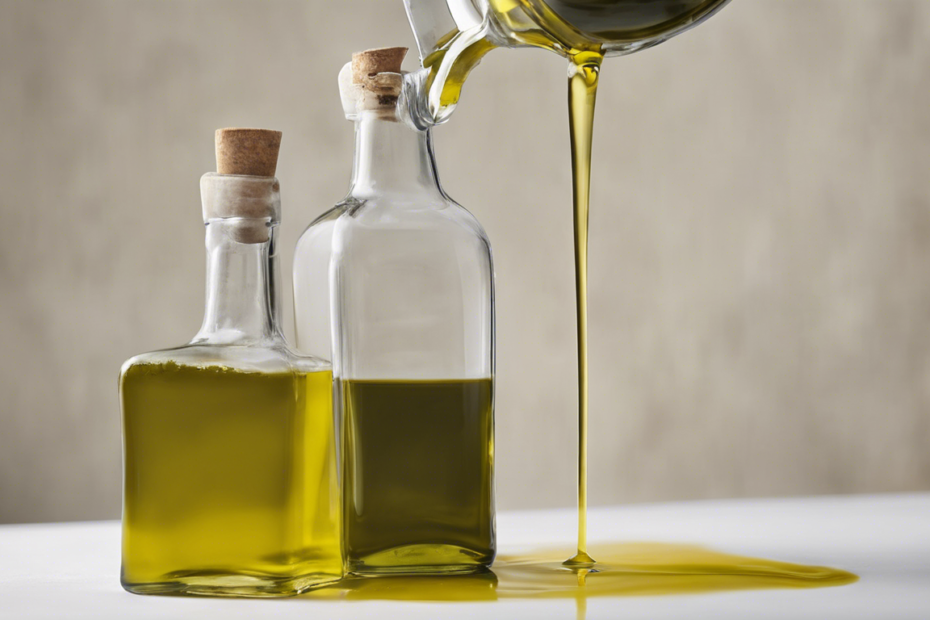When you think of healthy cooking oils, olive oil probably tops the list.
Renowned for its rich flavor and health benefits, it often gets a free pass in the kitchen.
However, today we’re peeling back the curtain on some of the hidden negatives of olive oil that you might not have considered before you drizzle it on your salad or pour it into your pan.
From its chemical composition to potential health risks and environmental concerns in its production, there’s more to this beloved oil than meets the eye.
Let’s dive in and explore what you really need to know before you pour!
Key Takeaways
- Olive oil, despite its health benefits, can have negative effects if consumed in excess.
- Understanding the chemical composition of olive oil can reveal potential harmful reactions in some individuals.
- Higher-quality olive oils may still contain harmful compounds due to improper storage and handling.
- The environmental impact of olive oil production raises ethical questions that consumers should consider.
- Choosing sustainable and ethically sourced olive oil can help mitigate some hidden negatives associated with its production.
1. The Chemical Composition of Olive Oil: What Can Go Wrong?
When we talk about olive oil, most people instantly think of its health benefits and that robust flavor it brings to dishes, but there are definitely some olive oil negatives that we should consider.
For starters, let’s dive into the chemical composition of olive oil; while it’s packed with healthy fats, the actual quality can vary widely, and not all oils labeled as ‘extra virgin’ are created equal.
You might unknowingly pick up a bottle that has been diluted with lower-quality oils or even rancid, which not only spoils the flavor but can also diminish the nutritional benefits.
Then, there’s the issue of overconsumption—sure, olive oil is healthier than butter, but too much can lead to extra calories that might pack on the pounds and even unexpected digestive woes.
And let’s not forget about the environmental and ethical side of things; with increasing demand for olive oil, some producers may resort to unsustainable farming practices that can damage local ecosystems or exploit laborers.
So, before you drown your salad in olive oil, it’s wise to think about where it comes from and how much you’re using!
2. Potential Health Risks Associated with Overconsumption of Olive Oil
While olive oil is widely celebrated for its health benefits and culinary versatility, it’s important to acknowledge the potential negatives that can arise.
First off, let’s delve into the chemical composition of olive oil.
If you’re not careful about quality and storage, olive oil can become rancid due to exposure to light, air, and heat, which not only diminishes its flavor but may produce harmful compounds.
Overconsumption is another concern – while it’s packed with good fats, too much of it can lead to excess calorie intake and weight gain.
And speaking of the bigger picture, the environmental and ethical aspects of olive oil production are worthy of a second glance, as some practices can involve deforestation and labor issues in countries where olives are grown.
So, before you go pouring that generous glug of olive oil into your dish, it’s worth considering these olive oil negatives that might just put a damper on your next Mediterranean feast.
‘The greatest danger in times of turbulence is not the turbulence; it is to act with yesterday’s logic.’ – Peter Drucker
3. Environmental and Ethical Concerns in Olive Oil Production
When it comes to olive oil, we often hear about its health benefits and culinary delights, but let’s not overlook some of the olive oil negatives that can truly raise an eyebrow.
One major concern is the environmental impact of olive cultivation—many farmers use mechanized methods that can lead to soil degradation and deforestation in regions where olive trees thrive.
Additionally, there are ethical issues tied to labor practices in some olive oil production areas; reports of poor working conditions and exploitation of laborers have surfaced, often leaving consumers questioning the sourcing of their beloved oil.
Plus, the rise of counterfeit olive oils diluted with cheaper oils can mislead shoppers who are just trying to find a quality product.
So, while olive oil can enhance your dishes, it’s essential to consider where it comes from and the broader impacts of its production.
Frequently Asked Questions
Is olive oil as healthy as everyone says?
While olive oil is often praised for its health benefits, overconsumption can lead to adverse effects due to its high-calorie content and potential imbalances in fat intake.
What are the chemical concerns with olive oil?
Olive oil can be subject to oxidation and may contain harmful compounds if not stored properly.
It’s essential to check that your oil has not been exposed to light and heat which can degrade its quality.
Can olive oil contribute to weight gain?
Yes, like any oil, olive oil is high in calories.
Consuming it in moderation is key to preventing excessive calorie intake that could lead to weight gain.
Are there environmental issues with olive oil production?
Yes, olive oil production can lead to deforestation, excessive water usage, and pollution if not done sustainably.
It’s important to choose brands that prioritize environmentally friendly practices.
What ethical concerns should I consider when buying olive oil?
Look out for fair trade certifications or brands that ensure ethical working conditions for their laborers.
Many olive oil farms exploit labor, so it’s essential to do your research.
